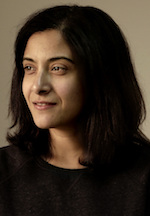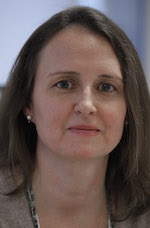It was a media mystery whose unraveling had potentially deadly consequences: Who is "Mosul Eye?"
For more than three years, Omar Mohammed was essentially a stealth historian in Iraq as he risked death cataloging ISIS horrors online as "Mosul Eye." He went to great lengths to hide his identity as he maintained his true persona as a jobless scholar in his native land. Hundreds of thousands read his dispatches, including journalists covering the region.
Ultimately, he fled to Europe and finally disclosed to the Associated Press that he indeed is the person who gave the world one window into the misdeeds of ISIS, including beheadings and stonings.
The story was broken by reporters Lori Hinnant and Maggie Michael. Hinnant is AP's Paris-based international security correspondent and has covered ISIS since 2013. Michael is a Cairo-based Egyptian journalist who joined the the news organization in 2002.
Poynter interviewed them about the Mohammed saga via email, with the two reporters responding jointly.

When did either of you first come in contact with Mosul Eye and did you, like most, not originally know his identity?
Lori had used Mosul Eye information from Facebook, Twitter and his blog for reporting on life under the Islamic State group and in Mosul in 2016. Maggie had been in contact with Mosul Eye over the past year for sources and information about IS, Mosul and civilians trapped in the city during liberation, without knowing his identity. In August, she reached out to Mosul Eye through his Facebook page for a story linked to IS.
Initially responsive, he stopped answering messages for several weeks. Maggie sent notes to a number of Iraqi activists in and outside of Mosul, asking how to reach him. Mujtahed al-Anbar, a well-known activist who focuses on IS in Iraq’s Anbar province, reached out to him via his other Facebook account, in the name of a 12th century historian from Mosul. It was Omar who responded to Maggie via that Facebook page. He then called her via WhatsApp using a Turkish phone number and answered questions related to IS.

When did serious discussions start taking place, presumably in Europe? Did one/both of you meet him face to face? I assume that location remains confidential and that the interview was shot in Europe.
Days later, when Maggie asked if he was open for an interview, he agreed and confirmed his location. We chatted over WhatsApp to arrange the interview. He agreed to meet Lori in a European city in mid-October at a cafe. It was Omar, with that phone number, who met Lori at the coffee house to discuss how to do a profile of him. We chatted afterward on WhatsApp and by phone.
A couple weeks later, when Lori tried to WhatsApp Omar on the Turkish number, she realized that he hadn’t logged in to that number for a couple of days. She used Facebook to contact the Mosul Eye Facebook account and figure out what had happened to Omar. He answered within 10 minutes with an instant message from that account, apologized, and said he’d just changed numbers and lost her contact information. He gave her a new phone number. We communicated again via WhatsApp.
Presumably others — I know of at least one reporter — were in touch with him there over many months but chose not to disclose his identity. What was key to that decision by him/you?
During our initial conversations, Omar mentioned wistfully that he missed using his name. Lori suggested that he might want to think about whether he wanted to reveal his identity, but then let the subject drop. We all spoke via WhatsApp repeatedly for other AP reporting in the meanwhile.
A few weeks later, Maggie and Lori arrived together to meet Omar. About an hour before the scheduled meeting, he called Lori and said, "I want to use my name and face." At the meetings from Nov. 15-17, we made sure repeatedly that he was certain in his choice and did not want to remain anonymous. During several hours over two evenings and many cups of coffee, he answered most questions and, at times, he choked back tears when remembering his mother and dead brother.
He is courageous, bright, sophisticated. But he's not necessarily a journalist. Tricky question: How can anybody know for sure that all that he says is correct? For example, there's no way, say, to independently verify his tale of smoking a cigarette right out in the open in dangerous ISIS territory on the Tigris, is there? How do you deal with the question of accuracy in general with Mosul Eye?
Omar gave us databases from his hard drive tracking the dead, noting daily events in Mosul. Each one was a separate file — totaling hundreds of files. The origin dates on each matched the date of the file, or at most was one or two days away from it. For his account of the day on the Tigris, he gave us multiple photos and a video from the day, each with an origin date in March 2015, which was when he said the events had happened. On Google Maps, he showed us the curve in the river where he picnicked, and zoomed on the marshy areas to show how it matched up with his account. As for himself blogging inside a dark room in his house in Mosul, he provided a video that AP used. He used maps to show his escape route. He showed on Google a list of the top students from his high school in Mosul, and his name was among the top five.
On the third day, just before we filmed over the course of about 90 minutes, he stepped away to make a phone call, in English, to announce that in a few minutes he would be shedding his anonymity as he didn’t want to be anonymous anymore. He showed us footage from his thesis defense, in which one of the professors accused him of secularism.
After the meetings, we asked Omar for contact information for his thesis advisor, who was among the few to figure out his identity during the early days of Mosul Eye; his younger brother, who he had told over the summer; activists and volunteers he worked with in Mosul; an American history professor he was in touch with via Skype since 2012, who knew his real identity. He provided all of this, and we spoke with all of them, including one person who, as it turns out, also figured out who he was and discovered that they have mutual friends. Omar provided us with links to his own scholarly work on Mosul. He sent over screen grabs of exchanges with a reporter from another news organization who he had worked with during the airstrikes to try and extract trapped civilians. He explained that, by that point, people were just messaging Mosul Eye in hopes he could help them. He acknowledged one other person had administrator access to the account: a Mosul woman now living in the U.S. who helped him with some of the interviews in English.
Omar explained to us how he cross-checked his information, and we put some of that into the story, but Mosul Eye isn’t an infallible source any more than anyone else, especially in a chaotic war environment. His death toll numbers, especially during the final months of the battle, are unconfirmed but in line with other estimates.That said, some of his unpublished notes read by Lori and Maggie, with origin dates from 2014 and 2015 and early 2016 especially, showed knowledge of IS that would only be published later. The leaflets he was collecting and publishing, the photos he was using to offer biographies and diagrams of their leadership showed a historian’s desire for documentation.
Several activists whom AP interviewed said that Mosul Eye was the only window to the outside world and that they have been closely following but fearing to even “like” or “share,” knowing that IS keeps an eye on social media.
What's your biggest takeaway from this story, be it about the war, ISIS or journalism/coverage of the conflict?
After the AP story moved, Omar confirmed from the Mosul Eye Facebook, Twitter and WordPress accounts that this was him. The evening the story was published, Omar called Lori in tears to say that a couple dozen Mosulis had gathered in a bookstore near the university with a friend of his to make a mass phone call and thank him.
He forwarded to Maggie messages from friends and neighbors sent to him privately and publicly via his personal account and the Mosul Eye page, thanking him for what he had been doing.








